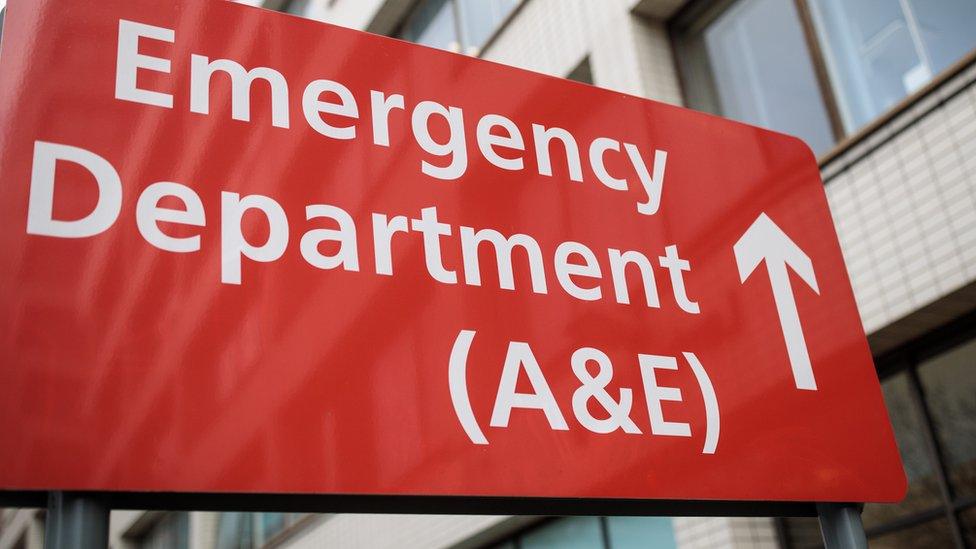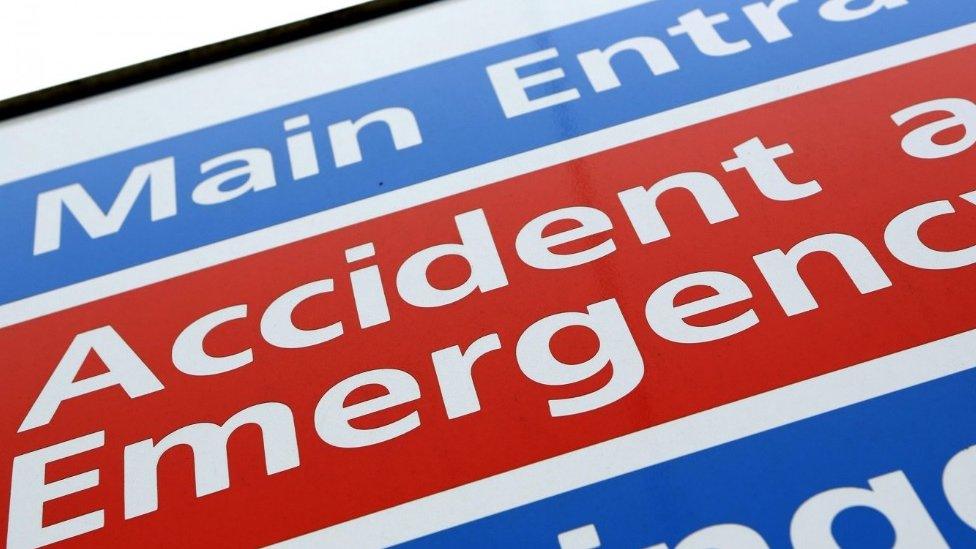12-hour A&E waits in winter 'becoming normalised'
- Published

The number of patients waiting more than 12 hours for a bed on a ward after being seen in A&E in England was 19 times higher this winter than it was before the pandemic, figures show.
There were nearly 100,000 12-hour waits in December and January - compared with slightly more than 5,000 in 2019-20.
A decade ago these waits were virtually unheard of - in the four winters up to 2013-14 there were fewer than 100.
The King's Fund said long delays were at risk of becoming normalised.
It said the pressures this winter had received little attention compared with last winter, despite no significant improvement in performance.

During December 2023 and January 2024, 98,300 patients waited more than 12 hours for a bed on a ward after A&E doctors took the decision to admit them.
These tend to be the sickest and frailest patient - and this wait comes after they have already waited to be seen in the first place after arriving at A&E.
Delays waiting to be seen in A&E are also much worse than they were before the pandemic - more than 30% of patients have waited at least four hours over the past two months.
One of those who has faced a long wait this winter is Alasdair Duncan, 32, from the West Midlands. He spent 23 hours in A&E after going in with a heart issue before being admitted on to a ward.

He said the hospital was "cripplingly understaffed".
"It was a long wait. You just see how stretched everything is. There were clearly a lot of people struggling to get care."
He was discharged after tests ruled out any concerning, ongoing heart problems.
Other parts of the UK are also struggling. Data is only available up to the end of December, but it shows Northern Ireland has the worst performance, with 60% of patients waiting more than four hours.
The Northern Ireland branch of the Royal College of Emergency Medicine (RCEM) said the pressures were "unsurmountable" and it was having a detrimental impact on patients.
On waits in England, RCEM vice president Dr Ian Higginson said measures put in place by the government and NHS England had failed to have much of an impact. Those measures include opening 5,000 extra hospital beds and creating 10,000 virtual beds - whereby patients with respiratory and heart conditions get extra care in the community, to keep them out of hospital.

He said hospitals were over-crowded and just as unsafe, if not more unsafe, than last year.
"The plans have made little real difference to the experience of patients," Dr Higginson suggested.
Saoirse Mallorie, a senior analyst at The King's Fund, said while the pressures on the NHS have not had as much attention as last year the situation was very similar.
"We are at risk of normalising incredibly poor performance," she said.
NHS England medical director Prof Sir Stephen Powis said the NHS had been under significant pressure this winter describing it as "one of the busiest winters ever" - and that was continuing into February.
He pointed out the number of patients in hospital with flu was particularly high.
But he said the "robust measures" put in place had helped.
Additional reporting by Kris Bramwell.

Have you experienced a long A&E wait? Share your experiences by emailing haveyoursay@bbc.co.uk, external.
Please include a contact number if you are willing to speak to a BBC journalist. You can also get in touch in the following ways:
WhatsApp: +44 7756 165803
Tweet: @BBC_HaveYourSay, external
Please read our terms & conditions and privacy policy
If you are reading this page and can't see the form you will need to visit the mobile version of the BBC website to submit your question or comment or you can email us at HaveYourSay@bbc.co.uk, external. Please include your name, age and location with any submission.
- Published17 January 2024

- Published14 March 2024

